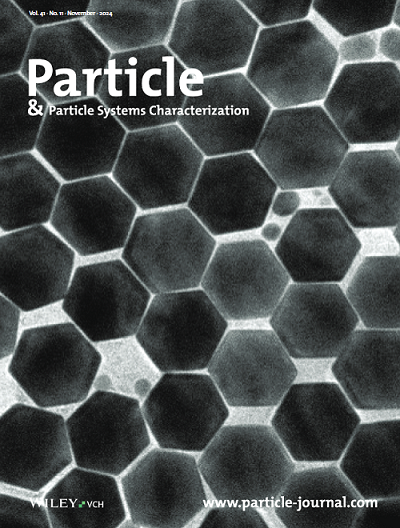Review on Preparation, Modification and Application of Nano‐Calcium Carbonate
IF 3
4区 材料科学
Q3 CHEMISTRY, PHYSICAL
引用次数: 0
Abstract
Nano‐calcium carbonate (nano‐CaCO纳米碳酸钙的制备、改性和应用综述
纳米碳酸钙(nano-CaCO3)是一种微小的无机填料,诞生于 20 世纪 80 年代。它具有高比表面积、良好的生物相容性和无毒性。因此,它被广泛应用于橡胶、塑料和造纸行业。本文旨在概述纳米 CaCO3 的制备工艺、表面改性和应用。特别是对纳米 CaCO3 的制备工艺条件、制备的纳米 CaCO3 的特性、表面改性的方法和机理,以及纳米 CaCO3 的主要应用研究进展进行了全面阐述。本文对从事纳米 CaCO3 研究的科研人员和相关工作人员具有很好的指导作用。
本文章由计算机程序翻译,如有差异,请以英文原文为准。
求助全文
约1分钟内获得全文
求助全文
来源期刊

Particle & Particle Systems Characterization
工程技术-材料科学:表征与测试
CiteScore
5.50
自引率
0.00%
发文量
114
审稿时长
3.0 months
期刊介绍:
Particle & Particle Systems Characterization is an international, peer-reviewed, interdisciplinary journal focusing on all aspects of particle research. The journal joined the Advanced Materials family of journals in 2013. Particle has an impact factor of 4.194 (2018 Journal Impact Factor, Journal Citation Reports (Clarivate Analytics, 2019)).
Topics covered include the synthesis, characterization, and application of particles in a variety of systems and devices.
Particle covers nanotubes, fullerenes, micelles and alloy clusters, organic and inorganic materials, polymers, quantum dots, 2D materials, proteins, and other molecular biological systems.
Particle Systems include those in biomedicine, catalysis, energy-storage materials, environmental science, micro/nano-electromechanical systems, micro/nano-fluidics, molecular electronics, photonics, sensing, and others.
Characterization methods include microscopy, spectroscopy, electrochemical, diffraction, magnetic, and scattering techniques.
 求助内容:
求助内容: 应助结果提醒方式:
应助结果提醒方式:


